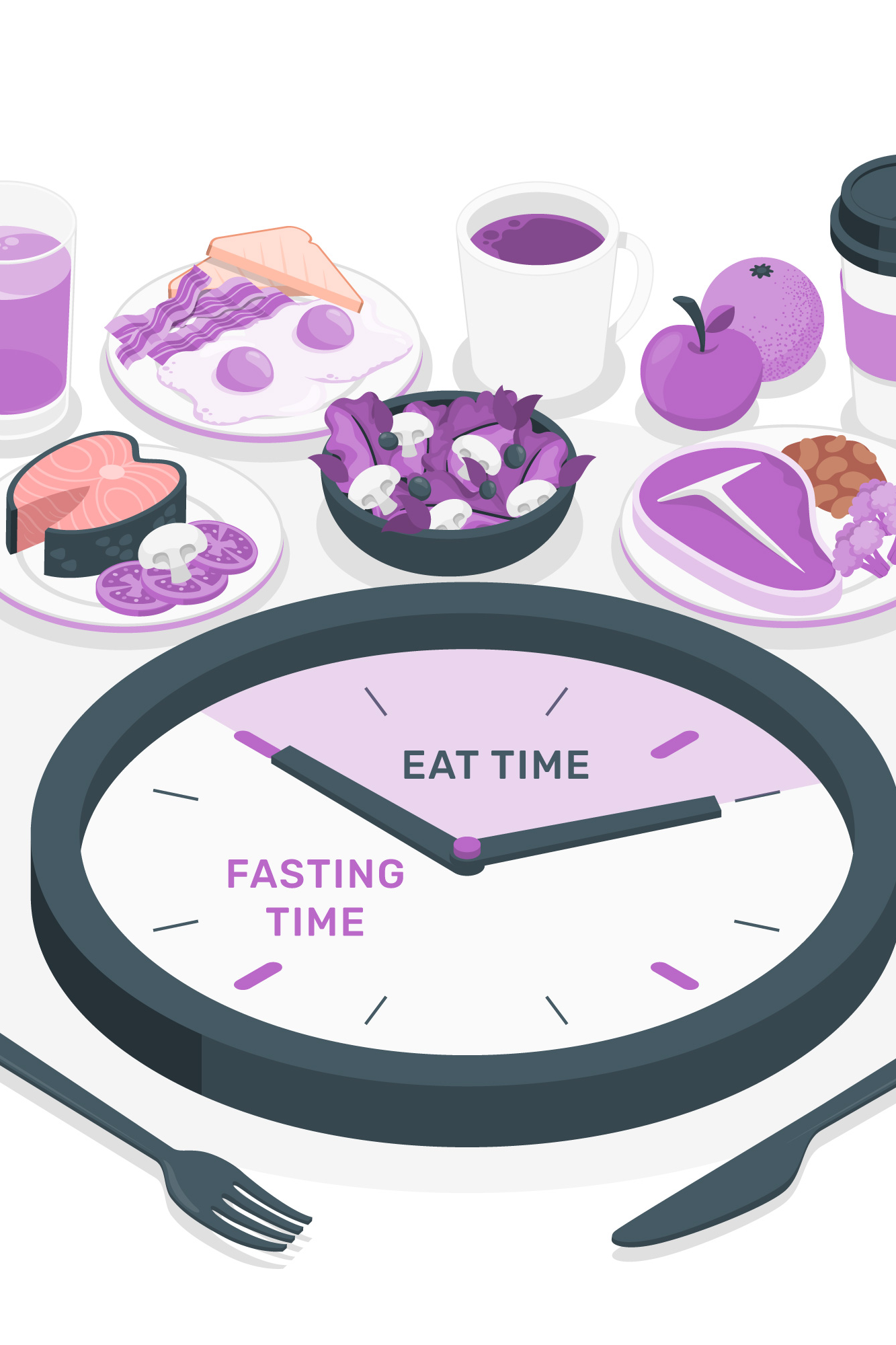These habits of women who always stay slim go beyond fad diets or rigorous exercise regimes, encapsulating a lifestyle that promotes health, wellness, and balance.
Understanding these habits can offer you insights into how to stay slim and toned, fit and healthy, and how to navigate the journey to a leaner physique without falling into the pitfalls of temporary solutions.
This post will show you seven key habits that have helped women stay slim with minimal effort, remain slender over 50, and maintain their trim figures without dieting.
Busy? Save this pin for later.
Follow an Intermittent Fasting Schedule
Intermittent fasting (IF) is an eating pattern that revolves around the timing of your meals, focusing on when you eat rather than what you eat. This approach has gained popularity due to its simplicity and the significant health benefits it offers.
Benefits of Intermittent Fasting
Intermittent fasting can lead to weight loss, improved metabolic health, and may even help with longevity.
It works by extending the natural fasting period that occurs when you sleep, which helps to regulate hormone levels.
This adjustment aids in fat burning and improves insulin sensitivity, reducing the risk of type 2 diabetes.
Additionally, IF has been shown to enhance heart health by improving blood pressure, cholesterol levels, and reducing chronic inflammation.
There’s also evidence suggesting potential benefits in brain health and protection against neurodegenerative diseases.
Different Fasting Methods
There are several methods of intermittent fasting, each with its own set of rules. The 16/8 method is one of the most popular, involving 16 hours of fasting followed by an 8-hour eating window.
Another common method is the 5:2 approach, where you eat normally for five days of the week and limit your calorie intake on the remaining two days to about 500–600 calories.
The Eat-Stop-Eat method involves 24-hour fasts once or twice a week. Each method can be tailored to fit individual lifestyle and health goals, making intermittent fasting a versatile option.
Tips for Successful Fasting
To make the most out of intermittent fasting, it’s important to stay hydrated and plan your meals during the eating periods to ensure they’re nutrient-dense.
Starting with shorter fasting periods and gradually increasing the duration can help your body adjust without excessive stress.
Listen to your body and consult with a healthcare provider to ensure that IF is safe for you, especially if you have underlying health conditions.
Eat Whole, Unprocessed Foods
Embracing a diet that prioritizes whole, unprocessed foods is a key habit among women who maintain a slim and healthy figure.
Benefits of Whole Foods
Whole foods, such as fruits, vegetables, lean meats, and whole grains, retain their natural nutrients, fiber, and phytochemicals, which are frequently lost during processing.
Research has shown that a diet rich in these nutrient-packed foods can help manage or even prevent chronic conditions like type 2 diabetes and heart disease.
Moreover, whole foods are naturally lower in calories and fats, making them ideal for weight management and overall health.
Examples of Nutrient-Dense Foods
Incorporating a variety of whole foods into your diet ensures a wide spectrum of nutrients. For example, leafy greens like kale and spinach are loaded with vitamins and minerals, while lean proteins such as chicken, fish, and legumes provide essential amino acids without the added fats.
Whole grains like quinoa and brown rice offer both fiber and essential B-vitamins, supporting energy levels and digestion.
Meal Planning with Whole Foods
Planning your meals around whole foods can simplify eating healthily. Start by building meals that feature a balance of protein, carbohydrates, and vegetables.
For instance, a dinner plate might include grilled salmon, a serving of quinoa, and a generous portion of steamed vegetables.
Prioritize Protein Intake
Prioritizing protein intake is crucial for maintaining a slim and healthy physique. Protein is not just a fundamental building block for muscles and tissues, but it also plays a pivotal role in weight management and metabolic health.
Importance of Protein for Weight Management
Protein is essential for various bodily functions, including the repair and maintenance of muscle, bone, and skin, as well as the production of enzymes and hormones.
It’s particularly important for weight management because it helps regulate hunger hormones like ghrelin and boosts satiety hormones such as GLP-1 and peptide YY.
This regulation can help you feel fuller longer, reducing the urge to overeat and assisting in weight loss.
Studies have shown that a diet high in protein can boost metabolism, reduce appetite, and even increase the number of calories burned during digestion.
High-Protein Food Sources
When increasing your protein intake, it’s important to consider a variety of sources to ensure a balanced intake of nutrients.
Animal-based proteins like chicken, turkey, and fish are excellent for their high protein content and bioavailability.
However, plant-based proteins such as beans, lentils, and nuts also provide essential amino acids along with fiber and other nutrients.
Protein Intake Recommendations
The amount of protein you need can vary based on your age, sex, weight, and activity level. Generally, the Recommended Dietary Allowance (RDA) for protein is 0.8 grams per kilogram of body weight.
For those looking to lose weight or maintain muscle mass during weight loss, the intake might need to be higher, around 1.2 to 2.0 grams per kilogram.
It’s beneficial to distribute protein intake throughout the day and include protein-rich foods in every meal to maximize the metabolic benefits.
Find Enjoyable Forms of Exercise
Finding an activity that you truly enjoy is crucial for developing a sustainable workout plan. It increases the likelihood that you’ll stick with it long-term.
Engaging in a workout that you look forward to can be energizing and help you maintain consistency over time.
Importance of Consistent Exercise
Consistent exercise is not just about burning calories; it’s about creating a habit that your body and mind start to crave.
Exercise produces feel-good endorphins, which keep the process fun and prevent burnout. Whether it’s the physical improvements in muscle tone or the mental health benefits from reduced stress, regular activity enhances your overall well-being.
Various Exercise Options
Experimenting with different types of workouts is a great way to discover what works best for you. If high-intensity workouts like boxing or CrossFit appeal to you, they might be perfect.
However, if you prefer something less strenuous, consider yoga, Pilates, or swimming. There are also enjoyable options like dance classes, cycling, or hiking. The key is to keep an open mind and try various activities until you find one that feels right.
Creating a Sustainable Workout Routine
When starting a new workout, it’s crucial to begin slowly and gradually increase your intensity. This approach helps prevent injury and burnout.
It’s important to allow yourself time to adapt to new movements and to build up your endurance and skill level.
A positive mindset and patience are essential, as it takes time to see results and develop a routine that you can adhere to consistently.
Practice Stress Management
Stress management is crucial for maintaining a slim and healthy physique, as chronic stress can lead to physiological changes that may cause weight gain.
When you experience stress, your body produces hormones like cortisol, which can increase your appetite and lead to cravings for high-calorie, sugary, and fatty foods.
Recognizing the connection between stress and weight gain is the first step in managing these aspects of your health.
To effectively manage stress, incorporating various stress-reduction techniques into your routine can be beneficial.
Techniques such as deep breathing, progressive muscle relaxation, and mindfulness meditation are not only easy to learn but also come with minimal costs and can be practiced almost anywhere.
These methods help in focusing your attention on calming activities and raising awareness of your body, which can significantly reduce the effects of stress.
Incorporating relaxation into your daily life is essential for long-term stress management and maintaining a healthy weight.
Regular practice of relaxation techniques can improve your ability to cope with stress by becoming more aware of muscle tension and other physical responses to stress.
This awareness can help you address stress symptoms early before they escalate. Additionally, relaxation techniques can enhance your overall quality of life by providing you with tools to decrease stress levels on a day-to-day basis.
Keep a Food Journal
Keeping a food journal is a powerful strategy to enhance your awareness of eating habits and improve your nutritional choices.
By consistently logging what you eat, you become more conscious of both the quality and quantity of your food, which can be instrumental in maintaining a slim and healthy lifestyle.
Benefits of Food Tracking
Food tracking helps you become more attuned to your dietary habits, providing insights into your portion sizes and nutritional intake.
This awareness is crucial for anyone looking to maintain or lose weight, as it allows for adjustments based on precise, real-time data.
How to Keep an Effective Food Journal
To maximize the benefits of a food journal, accuracy and consistency are key. You should record everything you consume, including details like portion sizes, ingredients, and the time of your meals.
This method helps in identifying specific eating patterns and recognizing potential areas for improvement. For instance, noting the time you eat can help you spot and adjust habits like late-night snacking.
Using Apps for Food Tracking
Many apps can simplify the food journaling process by providing features like barcode scanners, large food databases, and detailed nutritional insights.
These tools make it easier to log meals accurately and review your eating habits. Apps like MyFitnessPal and Lose It! offer user-friendly interfaces that encourage consistent tracking, which is crucial for effective dietary monitoring.
Avoid Late-Night Snacking
Eating late at night can be a challenging habit to break, especially if it’s become a routine part of your evening.
There is growing scientific evidence that consuming food too late could make it harder to manage your weight.
Research has shown that those who eat later in the evening tend to consume more calories and choose snacks that are higher in sugar and fat, which are less ideal from a nutritional standpoint.
Impact of Late-Night Eating on Weight
Late-night eating can lead to several adverse effects on your body, including weight gain and disrupted metabolic health.
Studies have indicated that eating a significant portion of your daily calories in the evening can lead to poor glycemic control and an increase in glucose intolerance.
This is particularly concerning for individuals managing conditions like Type 2 diabetes. Additionally, late-night meals might encourage the body to store more fat rather than burning it, contributing to increased body weight over time.
Strategies to Avoid Evening Snacking
To combat the urge to snack late at night, it’s crucial to focus on your dinner’s nutritional balance, ensuring it includes adequate protein, fats, carbs, and fiber.
This helps in feeling satiated and prevents hunger later at night. Planning your meals can also play a significant role in curbing late-night cravings.
If you find yourself hungry after hours, consider whether it’s due to boredom or actual hunger, and try to engage in other relaxing activities that divert your attention away from eating.
Healthy Alternatives for Night Cravings
If you’re genuinely hungry late at night, choosing the right type of snack can make a big difference. Opt for snacks that combine carbohydrates with protein, like whole grain crackers with cheese, which can help maintain consistent blood sugar levels.
Foods that are rich in protein and fiber are excellent as they make you feel full without needing to eat a lot.
Additionally, snacks like yogurt, nuts, and fruits like bananas and grapes are great because they contain nutrients that support sleep while satisfying late-night hunger without overwhelming your calorie intake.
Conclusion
Through the exploration of simple, sustainable habits, this article has illuminated the pathway to maintaining a slim and healthy lifestyle.
From the benefits of intermittent fasting and prioritizing protein intake to embracing whole, unprocessed foods and finding enjoyable forms of exercise, these tips serve as a beacon for those looking to navigate their health journey thoughtfully and effectively.
Moreover, strategies like practice stress management, keeping a food journal, and avoiding late-night snacking reiterate the importance of holistic approaches in achieving and sustaining optimal wellness.
In sum, embracing these habits does more than just promote a slim figure; it fosters a balanced life, enriched by wellbeing and vitality.
As readers incorporate these strategies into their lives, the ripple effect on overall health, confidence, and happiness can be profound.
While the road to a healthier self requires dedication and mindfulness, the guidance provided herein lays out a clear and attainable map for those committed to their wellness journey.
Armed with this knowledge and a commitment to self-care, maintaining a slim and vibrant lifestyle is well within reach.












Leave a Reply
You must be logged in to post a comment.